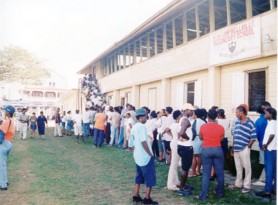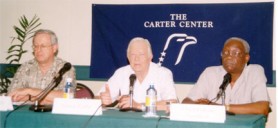The trend is clear. There is increasing evidence that the Guyanese public is losing enthusiasm and disconnecting itself from party politics. If the present ‘voter apathy’ persists, the number of voters will fall again in 2011.
Carter’s lament
Part of the problem was identified by former US president Jimmy Carter who used to hope that governance in Guyana would improve with the restoration of free elections. After twelve years, he realised that he was mistaken.
Carter first came to Guyana in 1992 when he met People’s Pro-gressive Party leader Dr Cheddi Jagan during the presidency of People’s National Congress leader Desmond Hoyte. As the head of the Carter Center, he assumed the responsibility of monitoring the historic October 1992 general elections. Since then, the Center worked with political leaders and private citizens to develop the National Development Strategy.
This six-volume strategy − drafted under the direction of Bharrat Jagdeo who was then Minister of Finance − called for “participatory democracy in which opposition parties would share fully in shaping policies of the nation.” It was Carter’s dream that this strategy would be a sort of blueprint for national development “based on a shared commitment of private citizens and political leaders working in harmony, regardless of their social status, ethnic origin, or political party affiliation.” Promises of constitutional reform that would fulfill this commitment were made.

Leaving Guyana for the last time on 13th August 2004, Jimmy Carter described his visit as “sobering” as his dreams turned into a political nightmare. He complained that, except among a few political party leaders, “there have been almost universal expressions of concern about the present condition and future hopes of Guyana, based on a failure of political leaders to heal the incompatibility and animosity that characterize their relationship.”
Carter lamented that, instead of achieving this crucial goal of inclusive and shared governance, “the Guyanese government remains divided with a winner-take-all concept that continues to polarize many aspects of the nation’s life.”
Carter eventually came to comprehend the simple truth that Guyanese politics had become a professional activity performed by full-time politicians for the benefit of themselves and their supporters. Most members of the National Assembly, he discovered, are “dependent upon, and responsible to, the political party that chooses them, and not to the people whom they profess to represent.” By 2004, desultory meetings between the administration and the main opposition political leaders had become sterile and agreements that were reached remained unfulfilled.
He thought that the political problem could be solved only with basic constitutional changes in the system of governance and, as a result, offered several recommendations to President Bharrat Jagdeo and Opposition leader Robert Corbin on some steps that might be taken.

Unaware that the administration had already consigned the voluminous National Development Strategy to the ‘dustbin of history,’ he recommended earnestly that: political leaders should consult with each other regularly, beginning with the implementation of agreements already reached, as described in the 6th May 2003, communiqué and other documents; the provisions of the National Development Strategy should be debated in the parliament with as many as possible implemented into law; the Standing Committee on Constitutional Reform should be reactivated to implement proposals for substantive governance and election system reforms, drawing heavily on civilian participation; and an independent civil society forum should be created to lead a structured national discussion on a vision for governance of the country to promote reconciliation and the National Development Strategy.
Jimmy Carter never returned. He must have come to understand that these recommendations are unlikely ever to be implemented.
The Davies doctrine
In a strange coincidence, six months after Carter departed in disappointment, Sir Michael Davies – an experienced, qualified, respected civil servant – was dispatched to conduct a study of the National Assembly, that most important institution of democratic governance, as the Common-wealth’s Senior Parliamentary Staff Advisor to the Guyana Parliament. Davies’s findings – entitled Needs Assessment of the Guyana National Assembly – turned out to be a sober, structured and serious indictment on the manner in which the Assembly was managed and the methods and mechanisms that the administration had devised to undermine the Assembly’s independence.
In brief, the Report concluded that the National Assembly’s weaknesses which the administration ought to correct were the result of its own administrative abuse and attempts to run the legislature like a government department rather than to allow it to function as a separate and independent institution. Accordingly, Davies’s recommendations to enhance the National Assembly’s effectiveness were perceived as threatening to erode the very mechanisms that the executive branch put in place to fortify its control over the functioning of the legislative branch. Davies drew attention to the fact that “meetings of the [National] Assembly are entirely at the whim of the Executive;” that both the staffing and the budget of the National Assembly are controlled by the Administration; and that the work of the committees “is subject to frustration by the Executive.” He criticised the practice of submitting parliamentary Order Papers for sittings of the National Assembly to the Office of the President which, he says, “can and does strike out questions and motions which the Office [of the President] does not like.” That practice, he added, “apparently only started in 1992.”
Davies noted that while the Administra-tion appeared not to accept the assertion made in his original Report that “the scheduling of meetings of the Assembly was entirely in the hands of the Executive,” he had seen evidence of this. He noted that the Administration “allows the opposition few opportunities to debate policy or to consider bills” and warned that “if Opposition Members cannot ask the questions they would wish to ask they will abandon parliamentary process in favour of other action, as they have done in recent years.”
Specifically, he added, “I was present at a meeting of the Parliamentary Management Committee on 1st February [2005] which was called at the request of Opposition members of the National Assembly expressly to demand a meeting of the Assembly to debate the flood situation and the government flatly refused to countenance a meeting for a further two weeks.”
Concluding that the “National Assembly of Guyana, though recognised as paramount in the Constitution, is sadly not playing its proper role in governance,” Davies identified seven main weaknesses – lack of independence of the parliament and its management from the control of the Executive; members who are not sufficiently au fait with their role within the parliamentary framework; an Opposition which is angry, frustrated and, therefore, does not grasp the opportunities afforded it by the rules of procedure; standing orders in need of revision; a committee system which is not properly functioning; insufficient qualified staff with ill-defined roles and lack of procedural knowledge; and no awareness of the National Assembly’s responsibility to relate with civil society, the private sector and the wider public.
Sadly, but not surprisingly, the President himself chose to lead the administration’s outright rejection of Davies’s Report, demonstrating that there was little tolerance for credible criticisms of its record of governance.
So strident was the administration’s response that Davies was called upon to issue an addendum to the original Report. Pointedly, he did not withdraw his initial findings but added further criticisms and clarifications of the way in which the National Assembly was functioning. Significantly, the Speaker Ralph Ramkarran took the Report seriously and started to implement some of its recommendations.
Democratic governance
Democratic governance is not the business of politicians alone. There must be vigorous participation in discussion on public issues by an informed population. This is what Carter had hoped for, in general terms. This is what Davies discovered was deficient in specific terms in the National Assembly.
What then should the Guyanese public demand of its politicians? The place to start must be the National Assembly which lies at the heart of democratic governance. Davies was correct when he advised that “scrutiny of the Executive is part and parcel of a sound democracy. Lack of scrutiny merely allows policies which have not always been properly thought through to be adopted without an understanding of the possible consequences.”
The communications media can contribute to the public interest by holding politicians to account by scrutinising legislation or providing the forum and the focus of our national conversation and debate. Indeed, the National Assembly’s ability to provide the forum and the focus of our national conversation and debate is heavily reliant on media coverage.
Owing to the administration’s absolute control of the state media and transparent attempts to control the legislature as well, public opinions are muted and public participation is restricted. As statistics for general elections continue to show, public reaction to those controls has been disengagement from the party political process.
Political competitiveness is inevitable, even essential. Over the last half century, however, competition has degenerated into antagonistic confrontation and open conflict. Five years ago, Jimmy Carter complained that the administration remained wedded to “a winner-take-all concept that continues to polarize many aspects of the nation’s life.”
Nothing seems to have changed.





